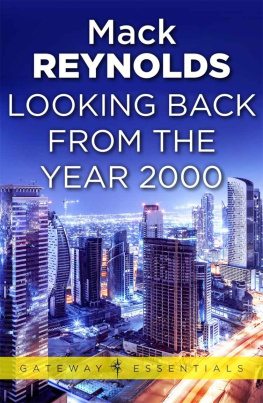Enter the SF Gateway
In the last years of the twentieth century (as Wells might have put it), Gollancz, Britains oldest and most distinguished science fiction imprint, created the SF and Fantasy Masterworks series. Dedicated to re-publishing the English languages finest works of SF and Fantasy, most of which were languishing out of print at the time, they were and remain landmark lists, consummately fulfilling the original mission statement:
SF MASTERWORKS is a library of the greatest SF ever written, chosen with the help of todays leading SF writers and editors. These books show that genuinely innovative SF is as exciting today as when it was first written.
Now, as we move inexorably into the twenty-first century, we are delighted to be widening our remit even more. The realities of commercial publishing are such that vast troves of classic SF & Fantasy are almost certainly destined never again to see print. Until very recently, this meant that anyone interested in reading any of these books would have been confined to scouring second-hand bookshops. The advent of digital publishing has changed that paradigm for ever.
The technology now exists to enable us to make available, for the first time, the entire backlists of an incredibly wide range of classic and modern SF and fantasy authors. Our plan is, at its simplest, to use this technology to build on the success of the SF and Fantasy Masterworks series and to go even further.
Welcome to the new home of Science Fiction & Fantasy. Welcome to the most comprehensive electronic library of classic SFF titles ever assembled.
Welcome to the SF Gateway.
Contents
For some years the present writer has been doing social science fiction, extrapolating in the field of socio-economics. During that period I have attempted to explore various future possibilities. This is the culmination. Old reader friends will recognize that I have pirated some of my own ideas in Looking Backward, From the Year 2000 from early work. They will please forgive me but the story would be impossible otherwise.
The student of political economy will also note that I have called upon the ideas of such authors of the past as Proudhon for the medium of exchange of the future, upon Daniel DeLeon for the structure of industry, upon Edward Bellamy for much of the basic idea and upon many contemporary writers such as Vance Packard, Ferdinand Lundberg, Herman Kahn and Anthony J. Wiener, Michael Young, Robert L. Heilbroner, Arthur C. Clarke, John Kenneth Galbraith and the late Frank Tannenbaum. I have also drawn extensively on the many participants in the work being done by many contributors to the American Academys Commission on the Year 2000 which appears in Daedalus, the Journal of the American Academy of Arts and Sciences.
I should also like to thank Raymond A. E. Klein, Director of the Eidos Theoretical Research group for his comments upon some of my pioneering ideas. A fiction writer is seldom blessed with a think tank to fall back upon.
Man may be skeptical about following the flight of the dodo bird into extinction, but the evidence points increasingly to just such a pursuit.
The planet and mankind are in grave danger of irreversible catastrophe if the political structure that now prevails is not drastically changed during the next few decades.
We live in a high-risk environment, and the trends that create the present level of risk continue to increase the danger and reduce the possibilities of creatively controlling it. There are four interconnected threats to the planetwars of mass destruction, overpopulation, pollution and the depletion of resources. They have a cumulative effect. A problem in one area renders it more difficult to solve the problems in any other area. The basis of all four problems is the inadequacy of the sovereign States to manage the affairs of mankind in the 20th Century.
Professor Richard A. Falk, Princeton
those societies which cannot combine reverence for their symbols with freedom for their revision must ultimately decay, either from anarchy or the slow atrophy by useless shadows.
Alfred North Whitehead
Is Americas romance with practicality and efficiency enough to sustain it? Men serving a system with no other goal than its further advance have no transcendent aims.
David Riesman
Why should men struggle to maximize income when the price is many dull and dark hours of labor? Why especially should they do so as goods become more plentiful and less urgent? Why should they not seek instead to maximise the rewards of all the hours of their days? And since this is the plan and obvious aspiration of a great and growing number of the most perceptive people, why should it not be the central goal of the society?
John Kenneth Galbraith
The Affluent Society
The present, for men who have no utopia, is inevitably constricting; and, similarly, cultures which have no utopia remain imprisoned in the present and quickly fall back into the past, for the present can be fully alive only in tension between past and future. This is the fruitfulness of utopiaits ability to open up possibilities. Paul Tillich
Critique and Justification of Utopia
through a strange alchemy of the Gods, there are a disproportionate number of kids coming along these days with IQs that are soaring toward a level too high to measure. These kids have very cold eyes. They are the ones who, one day, will stop playing with transistors, diodes and microcircuitry and look at Barrentown and start asking the rude questions. Or build a machine that will ask.
John D. MacDonald
The Quick Brown Fox
if we have learned one thing from the history of invention and discovery, it is that in the long runand often in the short onethe most daring prophecies turn out to be laughably conservative.
Arthur C. Clarke
The Promise of Space
one must either anticipate change or be its victim.
John K. Galbraith
All human beings are equal in rights and dignity, and only such a system of wealth distribution can therefore be defensible as respects and secures those qualities.
Edward Bellamy
Equality
I know of no safe depository of the ultimate powers of the society but the people themselves, and if we think them not enlightened enough to exercise their control with a wholesome discretion, the remedy is not to take it from them, but to inform their discretion.
Thomas Jefferson
The major advances in civilization are processes which all but wreck the societies in which they occur.
Alfred North Whitehead
The transformation were now seeing will make the Industrial Revolution of the 18th Century look like a pink tea.
Louis Levine
Chief Analyst in Employment Security
U.S. Department of Labor
Now
Thirty years, Julian West said. You mean all this has taken place in a third of a century?
Leete nodded. Dont underestimate thirty odd years in terms of history when times are ripe for change. He thought about it for a moment, pursing his lips as he attempted to put his finger on the illustration he wanted to use. The Egyptians managed to go through thirty dynasties without any substantial changes in their culture, their socio-economic system, their science. It was during their early fourth dynasty that the great pyramid, that of Khufu, or Cheops as we usually call him, was built. Two thousand years later at the time of the Persian and then the Macedonian conquests, the Egyptians were substantially the same, their society fundamentally unchanged. They arent the sole example. The Mayans of Guatemala and Yucatan came on the scene with a surprisingly advanced culturewere not sure, perhaps inherited from the Olmecs. They maintained this culture for a millennium, for all practical purposes unchanged.







